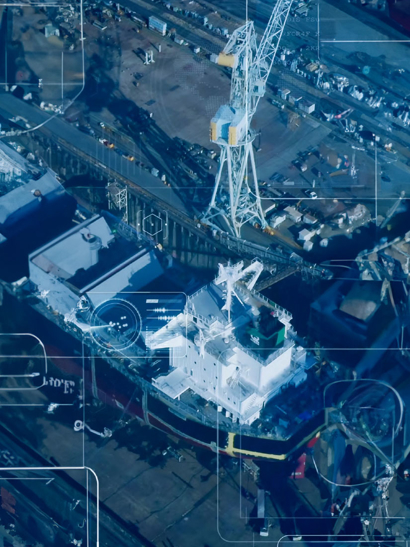Now more than ever, safety is ripe for digital transformation and disruption. This disruption will require not just an influx of ground-breaking new technologies, but reshaping industry culture, revamping training and even revising traditional processes, in order to effect real change.
One such technology beginning to transform and disrupt how safety and risk is managed in safety-critical industries, such as maritime, is video analytics. It can be used to detect or even predict unsafe situations, spot unintentional operator errors, or avoid future accidents, by analysing historical events. While it has been used extensively in a range of applications in various industries, its use in maritime is still in its infancy.
During the Lloyd’s Register Safety Accelerator webinar on 3 December, maritime experts Andy McKeran, LR’s Marine and Offshore Commercial Director, and Nick Chubb, Founder of Thetius, an organisation dedicated to enabling maritime innovation, explored how we might accelerate the uptake of safetytech in marine, delving into barriers and opportunities, as well as potential use cases of video analytics in the industry.
The session also featured exclusive showcases from leading video analytics technology companies, who are working with the Safety Accelerator to solve important safety challenges in maritime and beyond. Dr. Maurizio Pilu, VP for Digital Innovation at LR, who has a PhD in AI and Computer Vision and has worked with these technologies for many years explains, “It was interesting to hear at the event how maritime veterans feel that video analytics can be a real breakthrough in increasing safety and managing risk.”
During the event, the three video analytics companies presented their technologies and the client pilots they undertook through the Safety Accelerator. Senseye, who completed a pilot with Pacific International Lines in Singapore, uses technology that is also being trialled with jet fighter pilots, to assess (in just a few seconds) fatigue, or other potentially risky conditions of seafarers, before they go out on duty.
Sensing Feeling, who is trialling their privacy-by-design visual analytics technology in the retail sector, is working with bulk and tanker ship manager Scorpio, to study if patterns of behaviour on a bridge correlate with unsafe situations.
Lastly, IronYun plans to deploy a video analytics solution in a port environment to allow the end-user to configure their own real-time safety monitoring applications, thereby putting the power of AI in the hands of HSE professionals.

"It was interesting to hear at the event how maritime veterans feel that video analytics can be a real breakthrough in increasing safety and managing risk."
Maritime companies Scorpio and Wallenius Wilhelmsen also shared their journey with the Safety Accelerator, as well as their experiences and insights on digital innovation for safety, during the webinar. They were joined by Seaspan, who examined how we can all work together to pioneer safety innovations in marine and make a real difference in industry.
Dr. Pilu says, “It was really promising to hear one of the maritime companies that engaged with the Accelerator saying that working with early stage cutting edge tech companies went from being a ‘nice to have’ to a ‘must have’ and how working on their Accelerator pilot opened up a number of possibilities.”
“It’s quite clear that the potential is substantial – but more work is needed around privacy and trust and we are pleased that early-stage technology companies and clients alike believe that initiatives such as the Safety Accelerator can help create awareness and hands-on proof points, to resolve these issues for the industry,” Dr. Pilu reflected further on the learnings form the event.
In the past two years, LR’s award-winning Safety Accelerator has engaged with more than 600 start-ups and tackled 16 global safety and risk pilot projects with leading companies, or ‘Challenge Partners’, including Wallenius Wilhelmsen, Scorpio, Bernhard Schulte Shipmanagement, Seaspan, Shell, Benugo, HSE, KOTUG, PIL and many more, who have trialled innovative solutions from early-stage digital companies at their sites, ranging from sensor technology, machine leaning, AI and computer vision systems and data analytics.
The Safety Accelerator is launching a new batch of Open Innovation Challenges in January and is seeking industry leaders, or ‘Challenge Partners’, to engage with the programme, to tackle their biggest safety and risk challenges. The team would love to hear from you, so if you’d like to learn more, or would like the Accelerator to solve your safety challenge, visit:
Safetytech Accelerator








